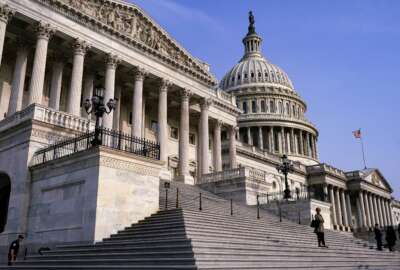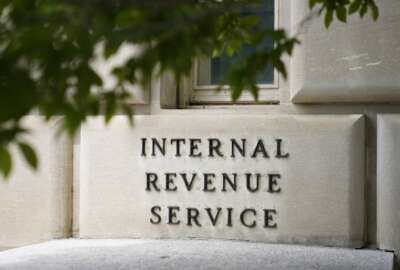What do people really mean when they say government should operate like a business?
When the nearly endless debates over the debt ceiling were raging on, the United States didn't look very businesslike to the rest of the world. Internally, though,...
When the nearly endless debates over the debt ceiling were raging on, the United States didn’t look very businesslike to the rest of the world. Internally, though, you never stop hearing that federal agencies should operate more like a business. This is both true and not true, according to my next guest. The Federal Drive with Tom Temin got commentary from American University professor Bob Tobias.
Interview Transcript:
Tom Temin Somehow, at these times when things are stressful on the political front or whenever people turn to federal agencies like the IRS, for example, and it should be like a business or has too much money or this, that or the other. Your thoughts?
Bob Tobias Well we hear often, as you suggest, that we should run the government like a business that’s both entrepreneurial, that’s willing to challenge itself to change and most importantly, measure its result. But from my perspective, the same people who make that challenge make achieving that challenge difficult, if not impossible. And I say this because a business can calculate its revenue and can plan its spending before the beginning of each year. Now, the budget year for agencies is October one, but Congress has completed its agency appropriation process on October one, just four times in the last 40 years, and the last time was in 1996. And what that means is that the agency has planned its spending over a 12 month period and gets maybe 11 or ten or nine months to spend. So it has to rearrange everything rush much, and from my perspective, achieve much less because of this failure to provide money on time.
Tom Temin Yes, and there’s a corollary there, because when you don’t have the money, you can’t initiate any new programs, for the most part, under continuing resolutions. So that compresses not only the spending time, but in the time you would have to execute something that you planned to have a year to execute. You may have six months to do it.
Bob Tobias Well, that’s true, Tom, and it makes it even more difficult because most appropriations are only for one year. So if you don’t spend it by the end of the year, if you don’t plan to spend it by the end of the year, you lose it and it goes back to the Treasury. You know, this year is no different. The agencies have submitted their 2024 budgets and the debt ceiling deal said now, for sure, every single budget is going to be cut by 1%. But as soon as the ink was dry on the debt ceiling deal, Congress said, well, no, we didn’t really mean 1%. It could be much more than 1%. And by the by, we’re thinking about shutdowns. So, again, there’s such uncertainty. And also, when you think about run it like a business, no business that was facing a budget cut would do across the board spending cuts. They would spend less on those who are less efficient and more on those who are more efficient. But in today’s budget climate, across the board, except for VA and DoD, implementing the number one charge from Congress about agency is innovate, buy more technology, implement more technology. But think about that, Tom. If I’m going to define what I need, if I’m going to bid, if I’m going to then decide and then I’m going to implement, I can’t get that done in a year. I just can’t get it done in a year. So if in year one I have $100, and in year two I only have $90. I have to make a choice. Do I continue with this, this technology or do I let it fail and call it all off? It’s easier for an agency not to do large technology reforms because of the uncertainty of the budget process. Running the government like a business is, I think, virtually impossible. And we can see the impact of budget uncertainty and its adverse impact if we look at the IRS
Tom Temin We’re speaking with Bob Tobias. He’s a professor in the Key Executive Leadership Program at American University. And yes, tell us more about your thoughts on the IRS, because so much of what people bring in their perception of how government ought to be, it all seems to come to bear in the crucible of the IRS sometimes.
Bob Tobias Yeah, I think that’s right. Congress recently appropriated $100 billion, no small amount over a ten year period to increase IRS’ technology, have better customer service, and to conduct more audits on those making more than $400,000 a year. The Congress also directed the IRS to develop and implement a free tax filing system which would make tax filing fee for those who have primarily W-2 income. It would be a tremendously valuable public service for those who make less and have the highest voluntary tax compliance rate. But during the recent debt ceiling deal, Congress cut IRS funds by $1.48 billion this year and in 2024 $10 billion, and in 2025, another $10 billion, which in the first instance threatens the IRS ability to develop and implement the free tax filing system. But this series of events also reveals Congress doing exactly the opposite of what any private sector business, large or small, would do, and that is to cut its revenue source. A team of researchers at Harvard, the University of Sydney and the Treasury Department looked at 710,000 tax returns over a 14 year period to determine the cost of conducting taxpayer audits and to determine the amounts taxpayers should have paid but didn’t. So interestingly enough, they found that the bottom one half of taxpayers break even, the IRS breaks even when they’re audited. So every dollar spent, the IRS gets nothing in return. But for the top 1%, the IRS got $3.18 back for every $1 spent and for the top 10th of 1%, the return is $6.29 for every dollar spent. But this report also did something that no one else has really done well, and that is to calculate the additional contribution that comes to the federal government from taxpayers who are audited. And they found that over the 14 years of the study, the additional tax paid by audited taxpayers on average was three times the revenue raised from the initial audit. And they found this impact to be exactly the same over every audited taxpayer. So audits plus the deterrent effect for the top 10th of 1% of taxpayer is a return of $12 for each dollar expended. So since the IRS is using the original $100 billion investment to focus only on those making more than $400,000 a year, which is close to the top percentile, the $20 billion cut in IRS funding is projected by this group to cost the federal government about $220 billion, $220 billion. Who knows whether it’s plus or -10 billion or 20 billion. But what’s important is, who would leave the money on the table? No business would leave the money on the table.
Tom Temin Well, yes. And maybe the bigger issue is if you had a tax code that was comprehensible and simple, which it’s not, it’s thousands of pages and people spend billions and billions and billions of man hours and dollars trying to interpret it through attorneys and so forth. If you had tax simplification, you would probably have instant better response and instant better compliance, which really rests on Congress.
Bob Tobias No question about that. But that’s not the game we’re playing. The game we’re playing are the hundreds of thousands of pages of tax law and an audit process that the IRS over the past few years is really broken. The point here, I think, is Congress cutting the ability of the IRS to conduct audits in this current environment leaves revenue on the table and is directly contrary to running the government as a business.
Copyright © 2025 Federal News Network. All rights reserved. This website is not intended for users located within the European Economic Area.
Tom Temin is host of the Federal Drive and has been providing insight on federal technology and management issues for more than 30 years.
Follow @tteminWFED






